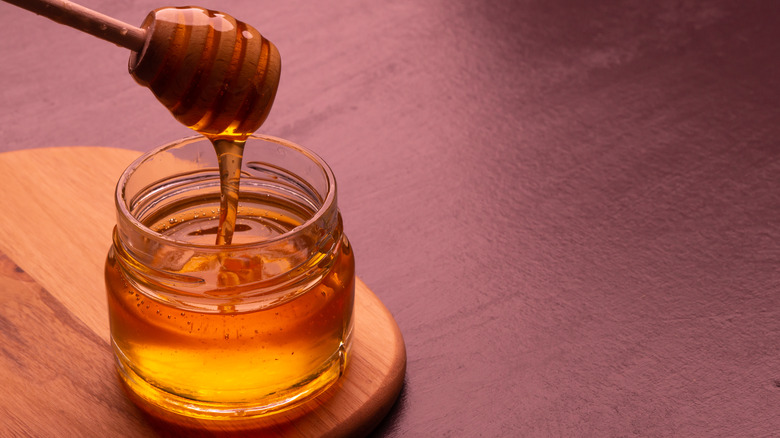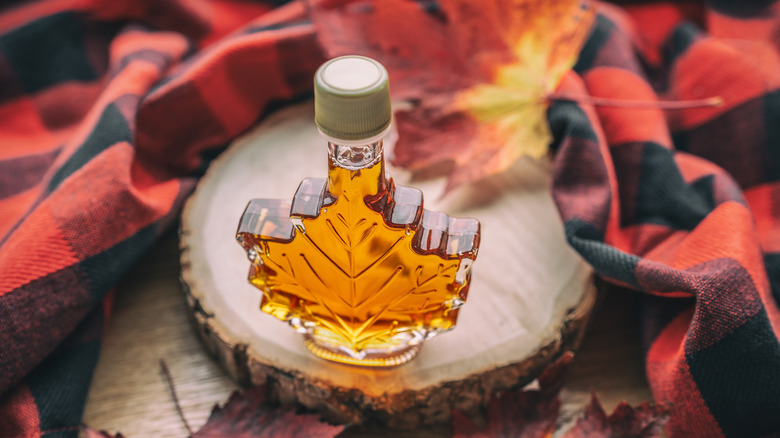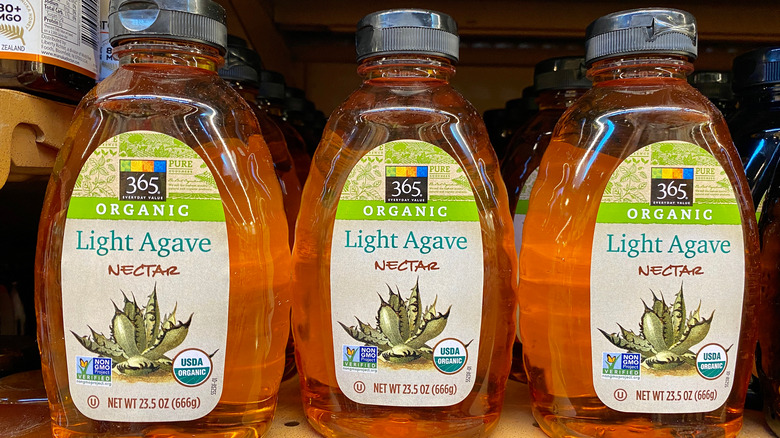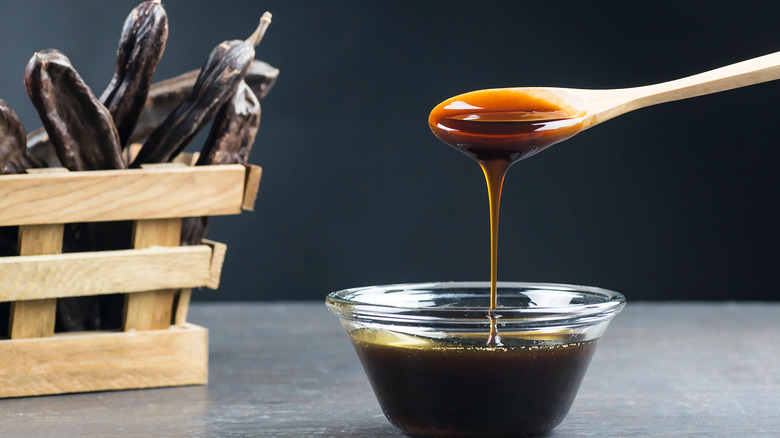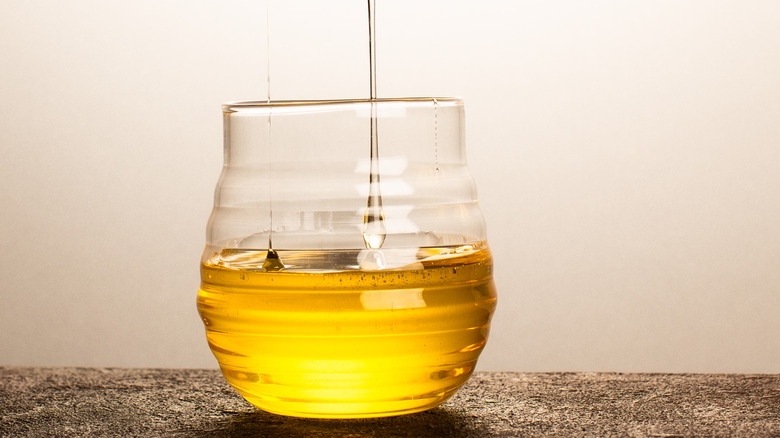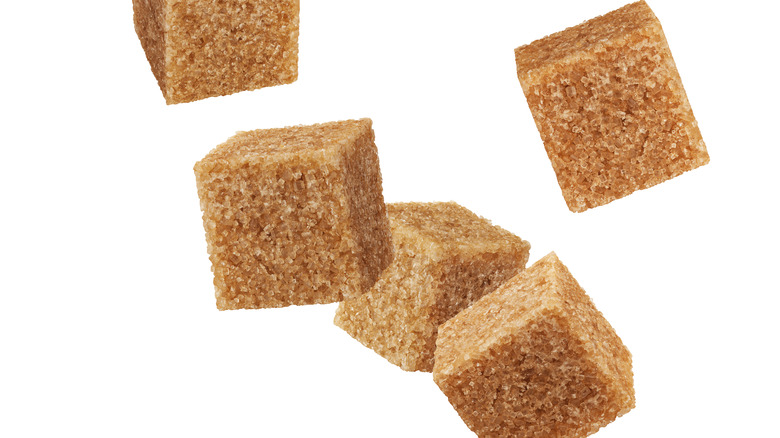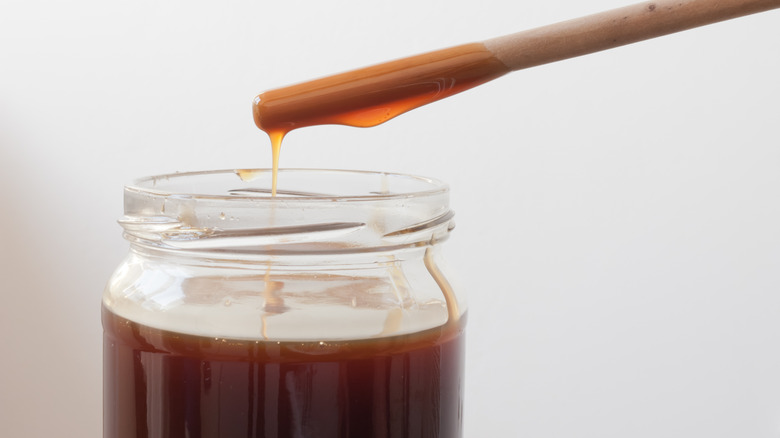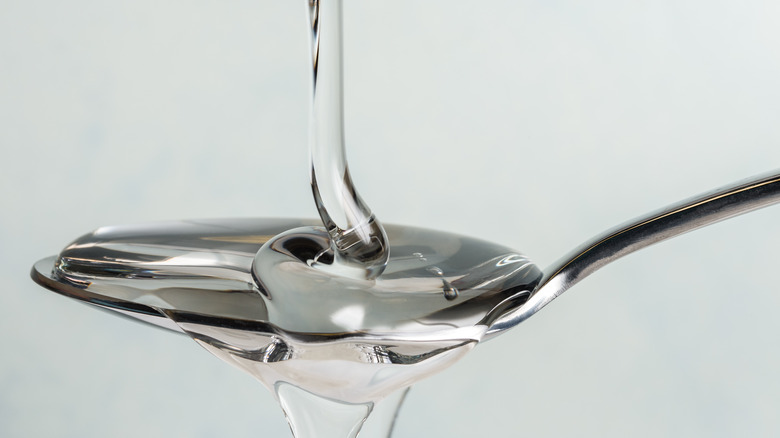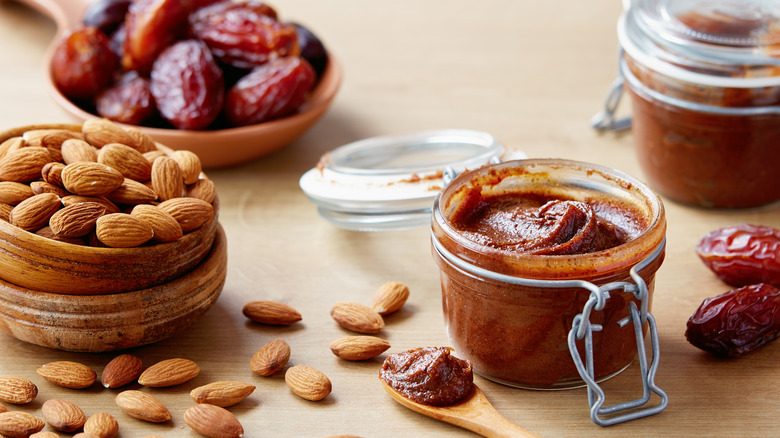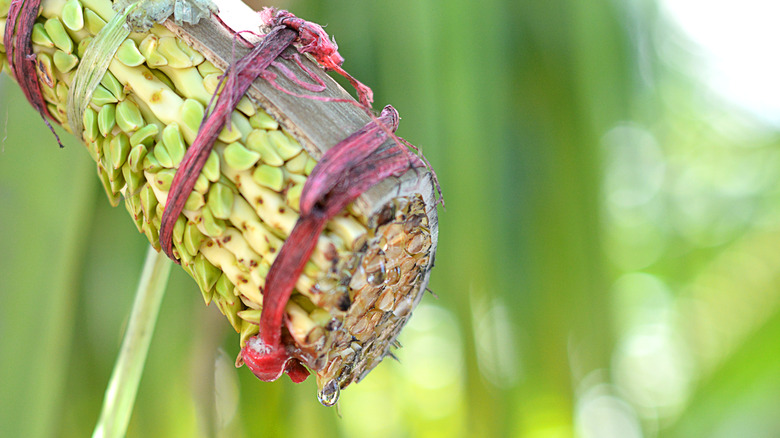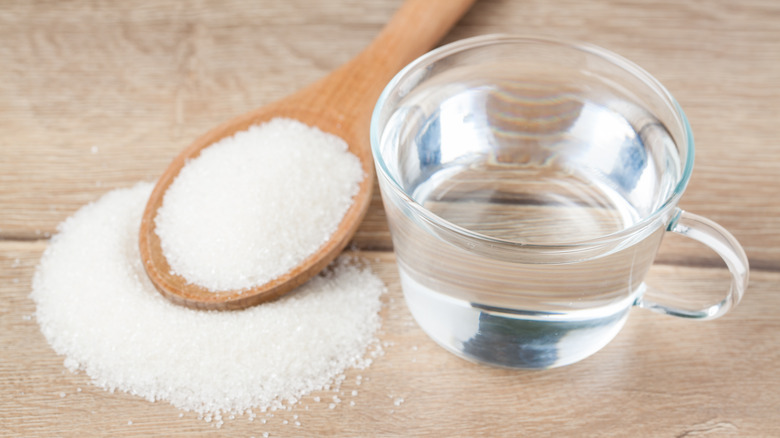10 Best Substitutes For Honey
Honey is an excellent all-natural sweetener that can be used for many things, ranging from baked goods to a cup of tea. Not to mention, its golden hue can make a dish even more visually appealing. But if you find your honey bear is empty, you might need to figure out another alternative to use until you can restock. Luckily, there are quite a few other options that will work in place of honey. Though some are a closer match than others, chances are you'll have at least one of these substitutes on hand at home.
To understand which substitutes are best for your needs, it can be helpful to understand a little more about honey itself. You likely already know that it is made by honey bees that collect nectar from flowers and turn it into the delicious syrup you know and love (via National Honey Board). Beekeepers then retrieve the honey from the combs inside the hive. There's also synthetic honey, according to HHU, which is made by acid hydrolysis of sugar with a dose of starch syrup added in for texture.
You can tell the difference between the two because synthetic honey will dissolve in water without stirring while real honey takes more effort to dissolve (via Bee America). So, depending on how you need to use honey, you might want a substitution that will dissolve more easily than others.
1. Maple syrup
Maple syrup is one of the best substitutes for honey because it has a similar texture and is often a staple pantry that's kept on hand, per Foodi Ideas. One very important stipulation for using maple syrup as an alternative to honey is that it should be 100% real, pure maple syrup. Some maple syrups have some percentage of water content which can affect the texture of the maple syrup when compared to that of honey. So for a better consistency, stick to the pure stuff. Maple syrup will definitely add sweetness to dishes like honey would, but it will also add its own distinct flavor, so consider that when using it in a dish too.
For the best results, use maple syrup in place of honey in baked goods, select drinks, and even in some marinades or toppings for meat like bacon or a baked ham. Maple syrup can generally be used anywhere honey is, just keep in mind that the strong flavor of maple syrup will be present in whatever you are making.
Use it as a one-to-one substitution.
2. Agave nectar
Agave nectar is another popular alternative to honey, especially for practicing vegans who oppose honey as an animal product. This sweetener comes from the same succulent that is used to make tequila and is just as sweet as honey, according to New Idea Food. The flavor and aroma of agave nectar is very mild, so you won't notice any unusual flavors when you use it to sweeten almost anything.
Agave nectar can be used in drinks and is commonly used in baking. The trouble with using agave nectar in baking is that it can cause the baked goods to darken more quickly because the sweetener darkens faster. So you might need to consider lowering the oven temperature. Otherwise, agave nectar can be used widely in anything from a touch of sweetness in salad dressing to glazing meat. Use it in sauces or most anything else you might need a bit of light sweetness.
Use agave nectar as a one-to-one substitution.
3. Molasses
Molasses most definitely has a thicker texture and viscosity than honey, but it is every bit as sweet as long as you stick to light or dark molasses. According to New Idea Food, blackstrap molasses can be much too overpowering to use as an alternative to honey. But if you stick to light or dark molasses, then you will have the same level of sweetness with more depth of flavor than honey. Molasses is also loaded with good nutrients like iron, antioxidants, and calcium (via Foodi Ideas).
Using molasses as a honey substitute will work for most baked good recipes, but keep in mind that it will add its own distinct flavor. Apart from baked goods, molasses is likely too thick for many dishes or recipes with honey, like drinks or dressings. It might be okay in some cooked sauces, which will allow the molasses to more thoroughly cook down and dissolve into the sauce.
Use molasses in a one-to-one ratio replacement for honey.
4. Golden syrup
Though golden syrup lacks the distinct flavor of honey, it is a very good alternative. The two have the same level of sweetness and even share the same hue. The major difference is that honey is a natural, raw sugar while golden syrup is made from refined sugar, so it is a more processed product, per Foodi Ideas. Golden syrup is higher in calories, but it will do the trick if you need to replace honey in most recipes.
You can use golden syrup as a direct one-for-one substitute in any recipe, be it sweet or savory. That means you can use golden syrup for honey in baked goods, as a coffee sweetener, in salad dressings, to glaze meat, or even in marinades. Golden syrup also tends to be a bit thicker than honey, but it will not affect the recipes.
5. Brown sugar
Brown sugar might be one of the easiest substitutions for honey around. This alternative will achieve the level of sweetness you are looking for as well as the depth of flavor that honey tends to provide. Brown sugar is readily available in most places and is probably already in your pantry if you need something right away. While you'll need to use a bit more brown sugar than honey that a recipe calls for, it is a close substitution.
While brown sugar is better than using plain white sugar — though it would work too — for the deeper, more caramelized flavor, brown sugar is only a good alternative to honey in cooked recipes, according to Foodi Ideas. Raw recipes that call for honey do not adjust well to using brown sugar, so try to only use this one if you are making baked goods or something else cooked on the stove.
For baked goods, use one cup of brown sugar for ever ¾ cup of honey used, per PureWow.
6. Rice malt syrup
Rice malt syrup is another option, though it might be harder to find than some of the other honey alternatives. Rice malt syrup tends to be a good vegan option for those avoiding honey and who don't want to use agave syrup for one reason or another, per New Idea Food. One added bonus to rice malt syrup is that it is doesn't have added sugars and is made by culturing rice. Its dark color and sweetness will give you a very similar effect as that of honey.
Though this product is not as easy to find, if you can get it, it is very easy to use in cooked dishes or recipes. It is particularly good for baking too.
Use rice malt syrup in equal parts to honey that a recipe calls for. If you do not need an alternative to honey immediately, you can order this online and have it shipped to you to keep on hand as well.
7. Light corn syrup
Another common pantry staple for many people is some type of corn syrup. Light corn syrup is a great substitute for honey too. It has a similar texture as honey and is certainly just as sweet. While you won't get the same distinct honey flavor from light corn syrup, the substitute will certainly work. Dark corn syrup can also be used, but it will have a deeper flavor than honey, so only use it if the recipe is one that can accommodate the flavor.
Light corn syrup is best used for baking, though it could be used in small doses in some recipes such as dressings or sauces. Dark corn syrup would be best in baked goods with more of a caramelized flavor such as spice cake or select kinds of cookies.
Feel free to use corn syrup in equal parts to honey.
8. Date spread
Date spread is a simple recipe you can make at home and it is a wonderful all-natural, raw replacement for honey. This substitute is also vegan and is fairly versatile. While Minimalist Baker uses dates to make date caramel, Foodi Ideas makes a similar concoction with a cup of dates, one and a half cups of water, and a squeeze of lemon juice all whipped up in the food processor. What you end up with is a smooth paste that is every bit as sweet as honey and has a distinct caramelized flavor. However, date paste is much thicker than honey so it can't be used in just any recipe that calls for honey.
Since date spread is as solid as it is, you can't use it to sweeten liquids like drinks or salad dressings. It is great for baking or even layering into desserts like a thin layer of caramel or honey. You can also use it to top desserts for a decadent flair. Just keep in mind that you can add up to another half a cup of water to make it thinner if you'd like.
9. Coconut nectar
Another unusual substitute that might not be your typical grocery store find is coconut nectar. However, you can definitely find it online. It certainly isn't a bad thing to have on hand in the cupboard when you need a honey replacement. Coconut nectar is a raw, vegan sweetener that comes from coconut flowers that bloom on coconut trees. Coconut nectar offers more health benefits than some alternatives because it is rich in vitamins and minerals (via Foodi Ideas). It's even low on the glycemic index which is impressive for a sweetener.
Though coconut nectar will add just as much sweetness as honey, it is best used raw rather than in cooked or baked recipes. That means you can use it in raw desserts, drinks, in salad dressings, and much more. Just don't reach for it if you need another sweetener for your baked goods like muffins, sweet breads, or marinades.
Use coconut nectar in equal parts to honey when using it as a substitute.
10. Super sweet simple syrup
Finally, if you have almost no other options on hand at home and need something right away, you can always turn to simple syrup in place of honey. Simple syrup is super easy to make at home and just calls for boiling water and white granulated sugar. What you'll end up with is a super sweet syrup that will mimic the sweetness of honey but not its typical flavor.
You can replace one cup of honey by combining one cup of water with five cups of sugar. Essentially, you'll need to work in a ratio of one to five to make your homemade simple syrup honey substitute. This combination will give you the level of sweetness you want from honey and a closer texture than regular simple syrup which tends to be more liquidy.
Use this substitute in drinks, dressings, marinades, glazes, and baking. It's a simple alternative that won't perfectly replicate honey, but it's versatile enough to make the effort in most recipes.
